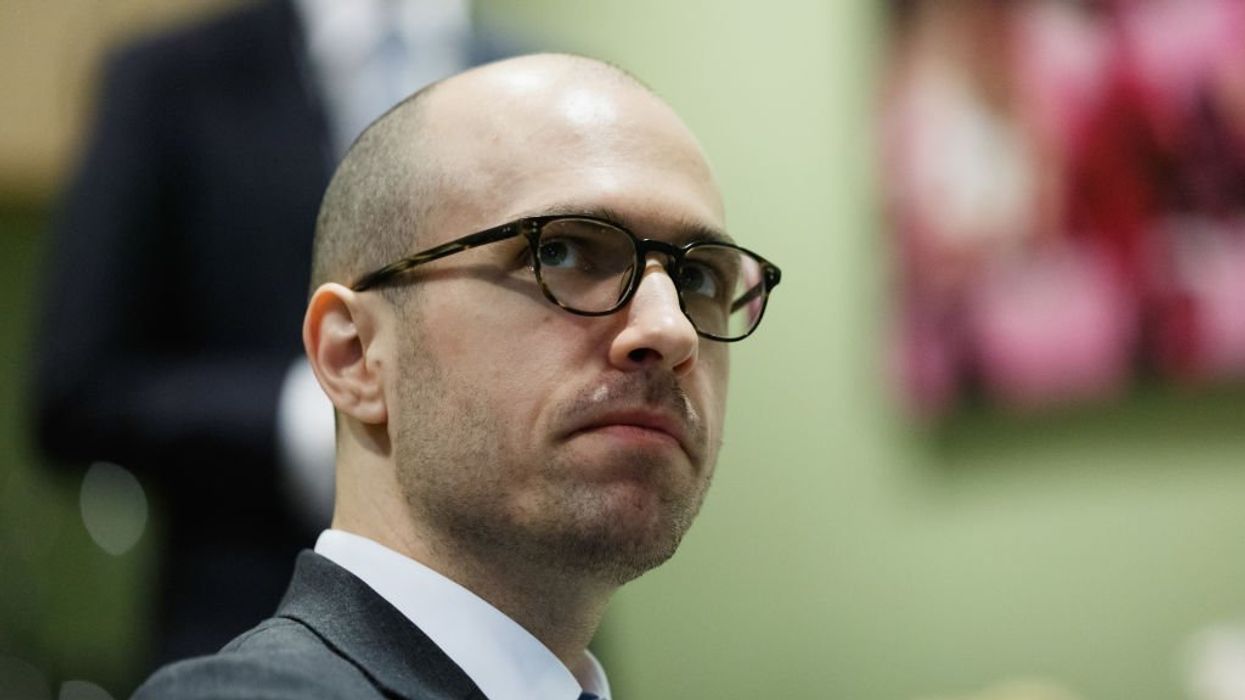
Photo by Michael Cohen/Getty Images

AG Sulzberger has signaled it's time once again to paint the corporate media as victims of Trump's reactive criticism.
A.G. Sulzberger, the chairman and publisher of the New York Times, concern-mongered Wednesday in the pages of the Washington Post about the fate of press freedoms under a second Trump term.
The multimillionaire newspaperman suggested that unlike his first go-around, this time Trump might actually come to resemble his caricatures in the Times and other establishmentarian outfits similarly compromised in bygone years by certain three-letter agencies.
As part of his mental gymnastics routine, Sulzberger attempted to draw parallels to real and perceived attacks on press freedom abroad — in countries such as India, Hungary, and Brazil — never once mentioning the successful efforts in recent years by the Biden-Harris administration to coerce companies to suppress and censor Americans' speech, including that of journalists such as Jim Hoft of the Gateway Pundit.
After insinuating that his paper is neutral and stating he isn't interested in "wading into politics," Sulzberger claimed that "would-be authoritarians" abroad found encouragement for their respective media crackdowns, not in President Barack Obama's war on whistleblowers or his Department of Justice's targeting of Julian Assange, but in Trump's characterization of the mainstream corporate media as "fake news."
'Trust in the news media sits at historic lows in much of the world.'
Sulzberger claimed that Trump used the term "as a cudgel to dismiss and attack journalism that challenged him," glossing over various other reasons informing the Republican's use of the term and why the term ultimately found such resonance with the American public.
The context that appears to be missing is that among the apparent targets of Trump's branding were those who dutifully suggested British spy Christopher Steele's Democratic-funded dossier was legitimate; falsely suggested that Trump and his team conspired with the Russians to secure victory in the 2016 presidential election; joined spies and the Biden campaign in falsely suggesting the Hunter Biden laptop story was Russian misinformation; and falsely claimed Trump said all Mexicans were rapists.
Sulzberger's own publication is not blameless, having been an exponent of the Russian collusion hoax; falsely claimed Trump supporters killed U.S. Capitol Police Officer Brian Sicknick with a fire extinguisher; falsely reported on the basis of terrorist propaganda that Israel blew up a Gazan hospital; and suggested that the Babylon Bee, a satire website, was a "far-right misinformation site."
Despite Sulzberger's portrayal of the corporate media as victims of Trump's hostility, he also neglected to mention that this hostility was for them both profitable and reciprocal.
According to Pew Research, 20% of stories in the press about Obama in his first 60 days in office were negative and 42% were positive. In Biden's first 60 days, 19% of the stories were negative; 27% were positive.
In Trump's first 60 days, 62% of the stories about his presidency were negative and only 5% were positive.
A Harvard University study found that 80% of the press coverage of Trump during his first 100 days — including in the Times — was negative. Thomas E. Patterson, professor of government and the press at the Kennedy School, wrote, "Trump's coverage was unsparing. In no week did the coverage drop below 70 percent negative and it reached 90 percent negative at its peak."
The only major dip in negativity came when Trump ordered missile attacks on Syria following allegations that Syrian President Bashar al-Assad gassed his own people.
The corporate media's attacks on Trump have continued into this election cycle.
The Media Research Center revealed last month that on CBS, NBC, and ABC, Kamala Harris was painted in a favorable light in 84% of their coverage, whereas Trump was depicted negatively in 89% of their coverage, reported the New York Sun.
Although Sulzberger was willing to acknowledge that "trust in the news media sits at historic lows in much of the world," he did not credit partisan hackery, "fiery but mostly peaceful" reports, or successive media hoaxes along the lines of the costly coverage of former Covington Catholic student Nick Sandmann's innocent smiling near the Lincoln Memorial in 2019.
Instead, Sulzberger suggested the decline was "helped along by the flood of misinformation, conspiracy theories, propaganda and clickbait unleashed on social media."
Sulzberger's ostensible expression of contempt for the free flow of information online was published the same day that users on social media forced the Associated Press to correct its latest misleading post.
According to the Times' publisher, Trump's supposed anti-press action "would likely be informed by his open admiration for the ruthlessly effective playbook of authoritarians such as [Hungarian Prime Minister Viktor] Orban."
The playbook, according to Sulzberger, usually involves the following five steps:
Sulzberger figures that Trump has proven himself open to the strategies in this playbook, having previously sued companies for defamation; expressed an interest in de-funding NPR; impeded Amazon's defense contracting over his "serial displeasure" with Jeff Bezos' Washington Post; and challenged corporate media companies' licenses.
The Times' publisher concluded his essay by recycling platitudes he's leaned on in recent years and with multiple paragraphs characterizing his publication as a bulwark against the imagined threats of a future administration or even state advertising revenue.
Like Blaze News? Bypass the censors, sign up for our newsletters, and get stories like this direct to your inbox. Sign up here!